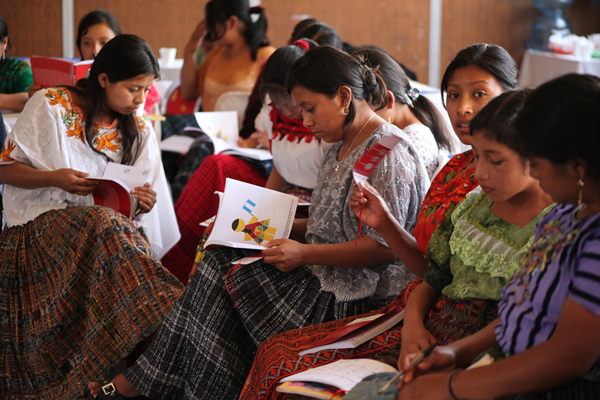
Emerging in the aftermath of Guatemala’s 36-year civil war, Abriendo Oportunidades® (AO®) launched in 2004 as a pilot initiative to address the structural exclusion faced by Indigenous girls. A gender-transformative, community-anchored intervention designed by the Population Council, AO has evolved over the last 20 years into a transformative social movement supporting over 25,000 Indigenous girls across more than 500 rural communities in Guatemala.
Initially piloted in four regions in Guatemala, the Council developed AO to reverse the shrinking opportunities for Indigenous girls at the onset of adolescence, a period often characterized by school dropouts, child marriage, and pregnancy. Indigenous communities also experience discrimination based on their language use, have historically had limited civic representation, and face systemic neglect. AO works to address intersecting forms of marginalization based on age, gender, ethnicity, and geography.
Drawing on rigorous studies and program evaluations conducted in Guatemala, the Council documented a pattern of disadvantage affecting Indigenous girls and developed an evidence-based model aimed at building their social, health, and economic assets. This led to the creation of a girl-centered, cohort-based, and participatory model that positions Indigenous girls not merely as beneficiaries, but as catalysts for social change.
At the heart of AO’s success lies in its use of safe spaces, age-segmented girls’ groups, and young Indigenous female mentors. Mentors—who come from the same communities as participants—lead AO sessions using a culturally grounded life skills curriculum aligned with Indigenous worldviews.
More than 20 years later, the program has delivered incredible impact in Indigenous communities around the country—and the Council continues to rigorously evaluate the program. By 2011, 100 percent of AO girl leaders completed the sixth grade—well above national averages—and 72 percent remained in school at the close of the program cycle. This is compared to only 29 percent of Indigenous girls aged 16–17 who remained in school nationwide.
Additionally, 94 percent of mentors reported increased autonomy, and nearly half secured paid employment, reflecting the program’s broader contributions to economic and social empowerment. A 2017 external impact evaluation study further confirmed AO’s effectiveness in improving educational outcomes—such as delayed dropout and enhanced grade attainment—and in reducing girls’ exposure to gender-based violence within their homes.
The success of AO in Guatemala has led to successful program adaptation and replication in Mexico (Abriendo Futuros) and Belize (Toledo Adolescent Girls Program). It has also informed gender-transformative mentor-based initiatives for young people in both the Dominican Republic and Honduras.
AO has also served as a launchpad for civic engagement, leading to the creation of two independent civil society organizations—REDMI Aq’ab’al and Na’leb’ak—led by former mentors. These networks continue to provide professional development opportunities while sustaining the program’s community impact. As community-anchored organizations, they enable mentors to advocate for girls’ rights, respond to their evolving needs, and connect girls with opportunities and resources within their communities.
Today, AO supports a growing movement led by young Indigenous leaders working to expand inclusive education and civic participation. Through professional internships, school reintegration pathways, and interinstitutional collaborations, young Indigenous women are building the skills, knowledge, and relationships needed to lead local development and shape national policies.
Population Council Guatemala has formal partnerships with key government institutions, including DEMI (Office for the Defense of Indigenous Women), the Ministry of Education, Ministry of Health, Ministry of Labor, and the Ministry of Social Development. These collaborations underscore AO’s evolution from a grassroots initiative to a significant driver of national policy.
As part of AO’s 20th anniversary celebrations, the Population Council is proud to launch the AO Legacy Series—a collection of briefs highlighting the program’s impact over the past two decades. We are also excited to share a short film that presents the history of AO and how Council research built a sustainable and effective model to support and empower Indigenous girls, adolescents and young people in Guatemala—and across the region.
With 20 years of evidence, we know that working with young Indigenous leaders is the key to co-creating localized solutions for real and meaningful change. Thank you to our many partners in this journey, and especially to the girls and mentors we have worked with along the way. We’re excited to keep the momentum going!
In this short film, key members of the Abriendo Oportunidades community, Judith Bruce, Kelly Hallman, and Elizabeth Vazquez, share how the program has evolved over the last two decades.
To learn more, explore the Abriendo Oportunidades Legacy Series, a collection of briefs celebrating and highlighting 20 years of impact for Indigenous girls.
- Brief #2: Growing the Abriendo Oportunidades® Ecosystem: Sowing seeds of change within government systems
